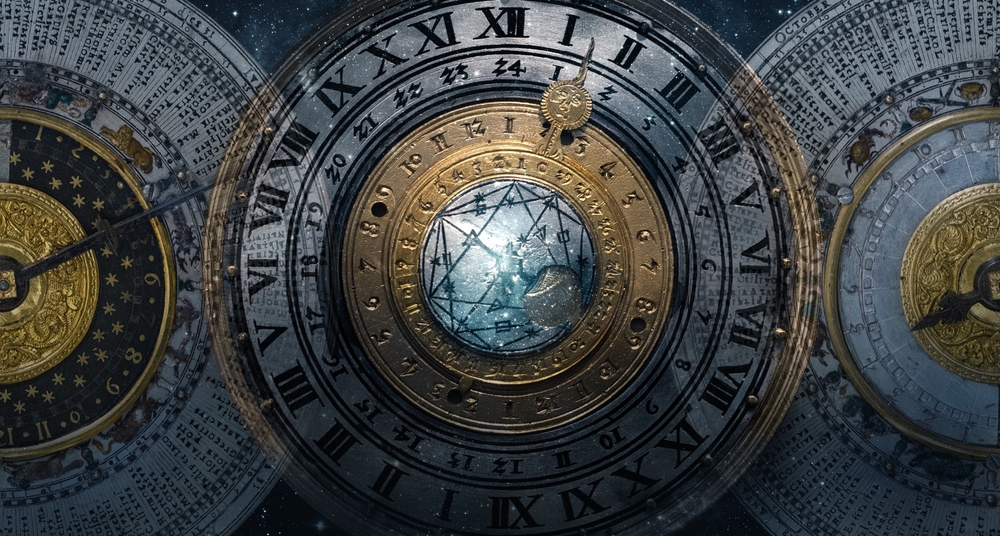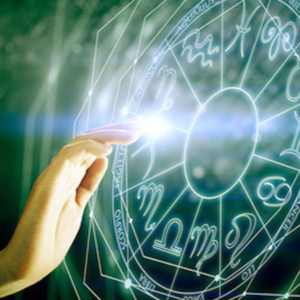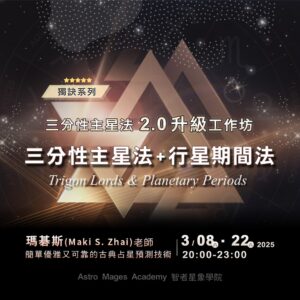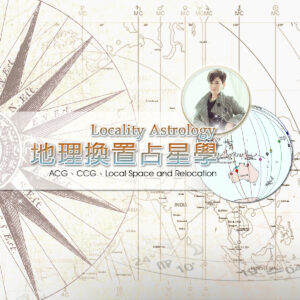讓天王星與水瓶座彼此解放
追尋一致性的旅程
本文提出一項觀點:我們這一代的許多占星師,曾將星座、行星與宮位進行了某種方式的連結,結果卻使得占星學變得混亂,也扭曲了其應用的範疇。在此,我想針對一個現代占星常見的對應關係,提出批判性的檢視,那就是:將水瓶座與天王星連結起來,主張天王星是水瓶座的「現代主星」,並取代或是加諸其傳統主星(即「廟主」或「宮主」)──土星。
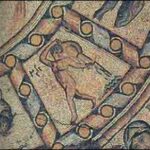 去年,我曾經撰文反對將宮位、星座與行星依照所謂的「十二字母法」強行對應。本文可視為此一主題的延伸。我也將進一步探討天蠍座與雙魚座之「現代主星」的關係[第三集_即將解鎖]。
去年,我曾經撰文反對將宮位、星座與行星依照所謂的「十二字母法」強行對應。本文可視為此一主題的延伸。我也將進一步探討天蠍座與雙魚座之「現代主星」的關係[第三集_即將解鎖]。
當天王星、海王星與冥王星這三顆外行星相繼被發現後,很快就被納入占星學的系統。當時,有些占星師一心想跟上現代潮流,便著手更新了黃道星座的傳統主星(或稱廟主星)的配置。原本,太陽與月亮分別掌管獅子座與巨蟹座,剩下的五顆「肉眼可見行星」則各自主管兩個星座。經過這番更新後,天王星取代了土星,成為水瓶座的主星;海王星取代木星主管雙魚座;冥王星則取代火星主管天蠍座。如今,占星師們的做法各有不同:有些只使用傳統主星,有些只採用現代主星,也有人主張兩者併用、稱為「共主星」。我自己則屬於第一類──只使用傳統主星。
以下這張表格列出了主星配置(或稱廟主星),並標示現代版本的更動之處。
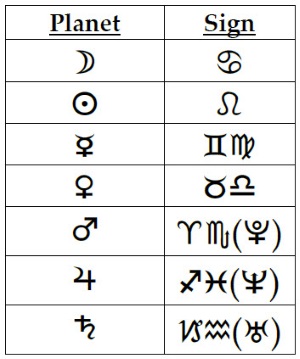
下圖是傳統星座及其主星(或稱廟主星)的對應模式。當外行星被納入這套體系後,原本的對稱美感便不復存在。
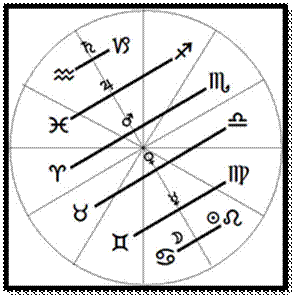
在我看來,這種試圖將占星學現代化的做法,最終導致天王星與水瓶座被「送作堆」,成了一段不愉快的權宜之姻。對天王星也好、對水瓶座也罷,兩者皆無所益,應該彼此解放。我們先來看看這顆行星本身。
天王星作為異數(Outlier)
 什麼是「outlier(異數)」?這個詞在近年因為一本暢銷書而更加為人所知,但其實它已有數百年的歷史,原意是指那些「躺」(睡或居住)在屋外或共有土地的人,也就是露宿之人。從這個角度來看,所有外行星其實都算「異數」,但似乎天王星尤具這項特質。
什麼是「outlier(異數)」?這個詞在近年因為一本暢銷書而更加為人所知,但其實它已有數百年的歷史,原意是指那些「躺」(睡或居住)在屋外或共有土地的人,也就是露宿之人。從這個角度來看,所有外行星其實都算「異數」,但似乎天王星尤具這項特質。
我最常用來掌握行星核心意涵的參考書是雷茵赫德.艾伯廷(Reinhold Ebertin)於1940年首度出版的《恆星影響的組合》(The Combination of Stellar Influences)。我們總得有個起點。書中第58頁,艾伯廷指出天王星的基本意義是:突發、革命、變化。我們先記住這幾個關鍵詞。
若從「空間」的角度來看,天王星是位於體系邊緣的異數,外部的攪局者,它為原有的秩序帶來根本改變的可能性;若從「時間」的角度來看,天王星代表突如其來的意外、不連續和驚訝。天王星的運作並不遵循線性時間觀或封閉的空間──它擾亂穩定性與結構,撕開那些我們習以為常、依賴習慣與預期所拼湊而成的世界縫隙。
天王星與閃電、地震以及突如其來的領悟,其關聯性顯而易見。我們大多體驗過閃電突現的瞬間,也有些人甚至經歷過地動山搖的驚嚇;我們往往覺得閃電令人興奮,地震則令人感到恐懼。
此外,我們都曾有過「靈光乍現」的時刻──思緒一躍而起,飛越過一連串的概念,直達某個嶄新的觀點。那個想法彷彿從虛空中冒出來,甚至不像是自己思考出來的。在占星學中,天王星正代表這樣的神來一筆,那些自發、無拘無束的心智閃現。
這也意味著:天王星不可能被固定在某個觀點、特定目的或意識形態。天王星並不人道,也不「動物關懷」(animatarian,這是我自創的詞),不女權、也不環保,它和這些立場都無關。天王星對那些政治正確,社會與個人所認為「應該要這樣那樣」的規範,無論是面對極右派財閥信徒、宗教原教旨主義者,還是我那些自由派的朋友──都毫無興趣。相反地,天王星揭露我們的矛盾與虛偽,尤其當我們被自己的預設立場餵養得過於自以為是、過得太安逸的時候。天王星代表我們內心和生活中那些不安定與出格的部分──真相也許能讓我們獲得自由,但它同時也會讓我們顏面無光。
天王星是「個人主義」之星嗎?
我們不該把天王星的「獨立自主」與現代所說的「個人主義」混為一談。雖然天王星確實會戳破社會規範,但它同樣擅長刺穿慣性思維。許多人在經歷天王星的過境時所感受到的,並非是對外在結構的反叛,而是對自己、以及那些為自己人生所建構的秩序。
如果我們所談的「個人主義」是指那種擁有獨立內核的人格,那麼應該看獅子座和太陽,而不是天王星。真正體現天王星式的個人叛逆,是孤獨且令人畏懼的;如果感覺不到這些,那你看到的恐怕只是青春期(的彆扭)或獅子座的張揚。
天王星是科技之星嗎?
是的──但僅限於新科技首次問世的那一刻。那是一種突破,打破了人們對可能性的舊有想像。然而當某項發明融入了生活日常,它就不再屬於天王星的領域,而是水星的範圍了。想想你正用來閱讀這篇文章的裝置,或是你用來列印它的機器──你與它之間的關係,不再是天王星式的驚奇,而是水星式的日常操作。
天王星是占星學之星嗎?
確實可以這麼說──對於剛接受誕生星盤解析,從而對現實產生全新認知時,那種經驗的確帶有天王星的色彩。又或者,當某些占星師透過占星的結構與符號獲得前所未有的洞見與觀點,那也可以歸於天王星;但我認為,天王星與占星學的關聯,僅止於這些片刻。
天王星是革命之星嗎?
是的,無論在政治、社會或文化層面,天王星確實象徵變革──但這種變革的力量終究有限。歷史與當今的世界早已告訴我們:劇烈動盪過後,若非迎來反撲,就是被逐步吸收,轉化為新的平衡。天王星一旦推動變局的角色完成任務,便功成身退,由其他力量接手。
天王星與內行星或個人敏感點之間的相位關係,往往揭示一個人在生命中經歷不穩定與靈光乍現的時刻。既難安於單一的生活模式,也常伴隨重大的人生轉折。這些相位標示出突如其來的個人變局,而這些變化常常促使一個人重新建構自我、反思並修正過往經驗,最終發展出一種全新的動態平衡。
有時,來自天王星的相位確實會對一個人的人生產生決定性影響,但這類情況屬於特例,而不是常態。例如,艾倫・圖靈(Alan Turing)的天王星與上中天合相,而尼采(Friedrich Nietzsche)的天王星則與水星形成精確對分相(同時太陽對分冥王星)。圖靈開創了電腦的概念與相關技術,一生也始終是個局外人;尼采則是一位飽受煎熬的思想者,他厭惡自身那種傾向於傳統德行的性格,他所追求的是「對一切價值的重新估定」,其寫作目的在於動搖而非教化。至於當代人物—愛德華・史諾登(Edward Snowden)也擁有相同的水星/天王星結構,但呈現方式則有所不同。我相信感興趣的讀者們必然能找到更多這類例子──那些生命深受天王星影響,並對世界產生衝擊的人。
當流運中的天王星與本命行星或個人敏感點形成相位時,往往會引發一時的混亂與變動。然而,倘若一個人的生命結構本就處於張力之中,那麼天王星的過境便可能動搖其根基,甚至帶來足以改寫人生軌跡的劇變。
水瓶座是另一回事
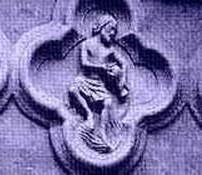 現在,讓我們將注意力轉向水瓶座。我將透過回應若干現代占星文獻中對這個星座的描述,來呈現我自己的觀點。此刻你只需記住:水瓶座屬於風象星座,屬性為固定。
現在,讓我們將注意力轉向水瓶座。我將透過回應若干現代占星文獻中對這個星座的描述,來呈現我自己的觀點。此刻你只需記住:水瓶座屬於風象星座,屬性為固定。
我重新翻閱了《占星師手冊》(The Astrologer’s Handbook),這本書由法蘭西絲・薩科恩(Frances Sakoian)與路易斯・艾克(Louis Acker)於1973年出版,也是我最早接觸的占星書籍之一。書中對水瓶座的描寫幾乎將它與天王星劃上等號,這樣的處理在我看來頗有問題。
「由於天王星主管水瓶座,友誼與夥伴關係對水瓶座人來說極為重要……出生在固定星座水瓶座的人,有著古怪的性情,個性堅定而固執……天王星的影響讓他們真誠地樂於認識新朋友、交換想法。水瓶座的群體本能總會引導他們走向有人群的地方,或是人群自然會聚向他們。」(第56–57頁)
首先,友誼與夥伴關係並不屬於天王星所管轄的生命領域。關於「友誼」這個主題,我慣常引用的參考資料來自古典時代──亞里斯多德的《尼各馬科倫理學》第八與第九卷。亞里斯多德將友誼區分為三種類型:享樂型、功利型與德性型。
大多數人年輕時的友誼以「享樂型」為主──一群能混在一起、從群體中尋求認同感的朋友。功利型友誼則具有情境性,卻同樣重要。它們往往建立在共同興趣之上,也正因為有這類關係的存在,許多人才願意每天去上班。而「德性型」友誼,則是彼此促進對方成為更好的人。這類關係更為穩定,關注的是彼此關懷,而非情感依附。這正是水瓶座的特質,而非天王星的表現──畢竟,水瓶座是風象、固定星座。某種程度上,這三種類型的友誼,也可以被理解為獅子—水瓶軸線上,不同階段的發展模式。
天王星的影響確實會激發人們對「新鮮感」的渴望,但我不會將這種傾向與「友善」混為一談,因為天王星本身太過不穩定、變化無常,難以維持穩定的人際關係。水瓶座常被認為具有一種「善意」的特質(這點我同意),那是一種冷靜、不黏人的善意,而這與天王星並無關聯。
我會將天王星型的友誼歸類為「功利型」友誼。這類朋友通常是你在集思廣益時的夥伴,是那些激勵你走上「非主流之路」、幫助你理解問題、或協助你發展創新策略的人。然而,一旦這些需求消退,這段關係也往往隨之淡去,直到未來再度出現需要合作的時機。
水瓶座作為風象、固定星座,其群體傾向正是源於這一結構屬性。但是,水瓶座的「群體本能」究竟是什麼樣的呢?顯然不是那種「想要趕流行」或「想顯得很酷」的心理──那比較像是獅子座或太陽的風格。水瓶座的群體導向更多建立在理念與原則之上,屬於精神層面的連結。這也解釋了為什麼當原則被破壞時,它會選擇疏離──不是為了彰顯個人立場,而是出於對整體價值的守護。我甚至認為,水瓶座在體現其所屬群體的理想時,其實是相當保守的。
薩科恩與艾克將「怪癖」(來自天王星)與「固執」(來自水瓶座的固定)放在一起解釋,這其實非常奇怪。這樣的組合聽起來,反而更像是一種可被診斷的人格障礙──至少也會讓人覺得此人古怪,難以長期相處。
同一時期還有另一部關於水瓶座的重要著作,是瑪西亞・摩爾(Marcia Moore)與馬克・道格拉斯(Mark Douglas)合著的《占星學:神聖的科學》(Astrology: The Divine Science)。這本書也是我早期學習占星時讀過的作品之一。他們在書中則將天王星與土星一同視為水瓶座的共主星。
「太陽位於水瓶座的人,體內似乎帶著一種微妙的電流,安靜卻有效地讓他們比表面看起來更有活力……若能活出內在潛能,水瓶座的人便能藉由召喚自然界更高的法則,超越一般的限制,而這對他們來說一點也不神祕。因此,這個星座同時與土星(法則)和天王星(突破)有關……太陽落陷於水瓶座,象徵性地顯示出個人性格的欲望,必須服從於整體社會的需求。」(第163–164頁)
這段描述比前一段更貼近水瓶座的本質。摩爾與道格拉斯強調了「水瓶座型人格」中低調、內斂的特質,並巧妙地與其對宮星座──太陽守護的獅子座──形成對照。(一顆行星落陷,必然位在其廟宮星座的對面星座中)。位在水瓶座的行星不會高調張揚,而是冷靜、克制,並試圖以理性應對事物。這些特質,與天王星毫無關聯。作為固定風象星座,水瓶座在寬容與堅信自己的理念正確之間取得某種平衡。水瓶座所展現出的那種自以為理性的姿態,正是天王星最愛戳破的東西。
那麼,水瓶座的思想與理想從何而來?這可以從它作為風象星座的性質來解釋。風象星座各有其處理「多元性」的方式,彼此互補但方式不同。雙子座透過開放各種觀點、讓情境中多樣性的面向自然浮現,並樂於觀察它們之間的動態互動;天秤座的方式則是調和與整合。而水瓶座則是根據脈絡、原則與理念,來組織這些多樣性。這與引文中所說的那種超越世俗、來自「更高法則」的說法,感覺不太一樣,但的確展現出水瓶座追求宏觀視角的特質。
摩爾與道格拉斯同時也指出:水瓶座需要將更大的群體或整體社會視為其參照點。若我們將獅子座視為「個人自我」,那麼水瓶座便是「社會性自我」。兩者都是固定星座的特質,在獅子—水瓶軸線上的不同展現。
再次強調,前文提到的那種「突破」性質,並不屬於水瓶座這一固定星座的本質,而是來自天王星這顆行星。可惜的是,在結尾硬是把天王星塞進來,反而破壞了原本對水瓶座還算中肯的描述。
有時,對水瓶座的描述是乾脆把這個星座等同於天王星。離我們較近的一個例子,是喬伊絲・萊汶(Joyce Levine)在1992年出版的《占星詮釋入門指南》(A Beginner’s Guide to Astrological Interpretation)一書中所寫的描述,她在書中說道:
「如同所有風象星座,水瓶座以理性面對人生;但由於受到天王星主管,他的想法常是在靈光乍現,宛如閃電劃過。他是思想上的開路先鋒,獨立、有創造力、富有發明精神。他對過去或傳統毫不在意。水瓶座相信打破界限、邁向未知的新領域……」
在補充一段水瓶座的人既友善又外向之後,萊汶接著寫道:
「他以一種近乎冷漠的超然態度看待世界,難以理解為什麼他人無法也這麼看……對他而言,自由比任何人都重要,而一段能長久維繫的友誼,必須建立在自由選擇與彼此獨立的基礎上……」
以下這段來自網路的水瓶座描述,其實幾乎整篇都是在描寫天王星,只有極少部分提及水瓶座本身。諷刺的是,在這篇名為〈一語道盡水瓶座〉(*Aquarius in a Nutshell*),展現的不是洞見,而是滿滿的意識形態:
「水瓶座是遠見者、不走尋常路、以及思想獨立的代表。水瓶座的人總是偏離人群、自行其道。他們渴望心智上的刺激,不斷發現新事物、形成新觀點,並固執地走在自己的路上,毫不在乎他人的看法。他們充滿矛盾:對極端的事物都有興趣,既喜歡獨處,又像社交蝴蝶;他們喜歡從兩方立場體驗、觀察,並以前瞻而活躍的思維發展出全新觀點。水瓶座奉行『你活你的,我活我的』的原則,認為每個人都應自由做自己。水瓶座從不評斷他人,因為人人平等,各自擁有表達觀點的權利……(略)」
「他們樂於迎接變化,因為無聊才是頭號敵人。對水瓶座來說,任何新鮮事都是機會。水瓶座能在任何主題上表現得像專家,他們也非常擅長提升自己的重要性,自認其與眾不同的怪異氣質使他們獨一無二。保守的人請小心,水瓶座就是喜歡挑戰與衝擊常規,這正是他們的生存之道。水瓶座也常針對那些他們認為軟弱或愚鈍的人下手,當作語言練習的靶子。他們並無惡意,但對方可不一定這麼認為。」(下載時間:2015年1月)
整篇文章以天王星的性質來描述水瓶座之後,我發現這篇文章的結語與前述內容,實在難以自圓其說:
「在內心深處,水瓶座絕不會刻意傷害任何人,他們尊重每一位人類──儘管這對情緒敏感的人來說,可能一點也看不出來。」
「挑釁那些被他們視為軟弱或頭腦遲鈍的人」,這顯然無法稱得上是「尊重每一位人類」。若是水瓶座,或許還會在意;但若是天王星,我懷疑它是否在乎。
較為貼近核心的,反而是將水瓶座置於黃道循環脈絡中來詮釋的描述。這種觀點由丹恩・魯迪海爾(Dane Rudhyar)首創—摩羯座完成了集體自我的建構,緊接其後的水瓶座則肩負著堅守基本原則的任務。這種以周期循環來詮釋黃道星座,確實有助於釐清各個星座的基本意涵;但它的說服力受到限制,因為這種詮釋完全是建立在北半球的晝夜變化之上。
麥可・梅耶(Michael Meyer)在1974年出版的《人本主義占星師手冊》(Handbook for the Humanistic Astrologer)中,提出了一些值得我們思考的基本概念。
-
- 原則(Principle):社會性的表達
- 歷程(Process):社會角色的外顯
- 目的(Purpose):回應社會的需求
- 抽象意義(Abstract Meaning):能以群體或集體方式去創造與表達;個人的不安。
- 具體意義(Concrete Meaning):科學、音樂與天才;政治運動與革命;人道主義、群體與集體理想。
在這裡,我們看到水瓶座扮演吹哨者的角色──願意冒著失去事業,甚至失去生命的風險,揭露集體體系中的過失,而最終是為了這個體系的長遠利益。我們也能在某些政治領袖身上看到這些水瓶座特質──他們以創新作為維持秩序的手段。
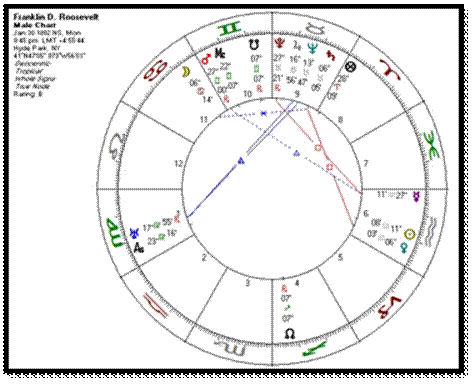
富蘭克林・羅斯福(Franklin Roosevelt,見上方星盤)推動了「新政」,阻止美國在1930年代滑向社會主義或法西斯主義──這兩者在當時都是真實存在的可能性。他的改革實際上讓資本主義的根基比以往更加穩固。
亞伯拉罕・林肯(Abraham Lincoln)的太陽與上升點皆位在水瓶座,他不斷援引美國開國元勳的理念與《聖經》的價值觀,為這個飽受戰火摧殘的國家提供方向與希望。
就我個人而言,較不吸引我的例子是隆納・雷根(Ronald Reagan)。他徹底地重組美國財政政策,試圖恢復企業家精神,並打造一個更自由的市場體系。
土星主管水瓶座?你在開玩笑吧。
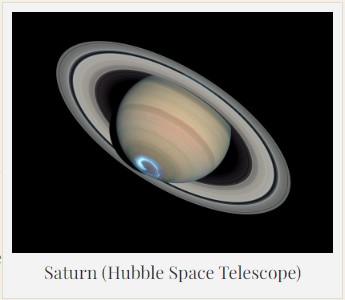
許多現代占星師習慣將土星視為階級分明、缺乏幽默感、帶有嚴苛壓抑的象徵,而將水瓶座視作平等、公正、創新的象徵。照這樣看,土星似乎不可能是水瓶座的主星。但在前面我們已經看到,現代對水瓶座的描述,大多是將原本應歸屬於天王星的意義硬塞了進去;另一方面,許多關於土星的描述,往往也只是重複了摩羯座的刻板印象。在這裡,我們將談談屬於日間區間的土星,而非與摩羯座關聯的那一面。
如前所述,五顆肉眼可見的行星(從水星到土星)各主管兩個星座,也就是說,每顆行星皆有兩個廟位(或稱「廟宮」)。對於擁有兩處房產的人來說,很容易理解:不同住所會展現居住者的不同特質,尤其當一棟是度假小屋,而另一棟是離工作地點很近的時候。如果你懷疑同一顆行星如何能展現出兩種不同的面貌,那麼看看金星在金牛座與天秤座的差異就能明白了──前者偏向感官享受與奢華,後者則專注於人際關係與和諧。同樣地,水星也有雙子版本與處女版本,一個較為隨興發揮,另一個則更有條理與系統性。
摩羯座的土星較為粗獷、憤世嫉俗、背負重擔且歷經鍛鍊,意志堅強、絕非柔弱之輩。這樣的土星,完全符合摩羯座的性質──啟動土象星座。而土星同樣也非常適合擔任水瓶座的主星──只不過是住在另一棟房子的土星罷了。
日間的土星(diurnal Saturn),正是那顆在風象天秤座「入旺」的行星:理性而講理、穩定而堅定。這顆土星以其「客觀性」自豪,懂得在面對重要問題時放下個人偏好;它也不會被瑣碎事務或個人野心所干擾。受到這顆土星影響的水瓶座,對那些以自我為中心、假天王星之名的浮誇行徑本能地感到排斥,與自戀的獅子座形成對比;正如摩羯座的土星反對巨蟹座那種情緒化與自我放縱傾向是一樣的。(當然,這是從土星的觀點來說的。)
當某顆行星位在由土星主管的水瓶座,它會變得更加超然、理性、有系統性且井然有序。
最後,我將以一個例子作結:
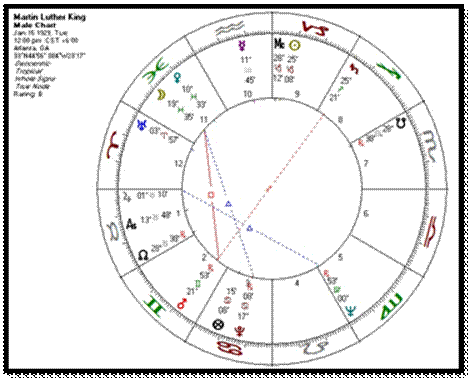
馬丁・路德・金恩(Martin Luther King)出生時太陽位於摩羯座,正好位在上中天;他的水星則位在第十宮水瓶座。我們可以觀察到水星水瓶對他演說風格的影響,也就是他在公眾場合展現溝通能力的方式。很明顯地,金恩試圖將「美國夢」擴展到那些原本被排除在外的人們,而他的著名演講〈我有一個夢〉也確實帶有一種對美國開國精神的懷舊情懷──他回望美國建國初期的核心價值,並以此作為邁向未來的出發點。
當我準備撰寫金恩博士的占星側寫時,讀到《紐約書評》(New York Review of Books)的一篇文章,由伊莉莎白・哈特曼(Elizabeth Hartmann)撰寫於金恩遇刺後不久。文章開頭形容金恩帶有貴族氣質,性格冷靜,這或許符合他太陽在摩羯座的特質;但接下來,她則描述了他的講道風格:
我將那些帶有『日間土星主管水瓶座水星』意涵的詞語標示出來。
「金恩在教堂講道與發表演說時所使用的語言,雖然極具感染力,卻談不上特別引人入勝。然而,與近年總統們的演講相比,甚至與史蒂文森(Stevenson)的演說相比,他的風格仍算出色──這些人的演說一旦變成文字,都令人遺憾地變得平淡無奇。從許多方面來看,金恩的語言風格並沒有南方鄉村的氣息。儘管他有一口溫潤的喬治亞口音,談吐中卻充滿了《聖經》的語感。他的語言風格是務實的,既能激勵南方黑人投身抗議、承擔犧牲與風險,同時又以清晰易懂和接地氣的方式令人感到安心。金恩的講話最動人之處,在於那種突如其來的簡潔純粹。例如,他在華盛頓為貧困群眾集會總結時說道:『我們是來領支票的!』
年輕一代激進分子的語言風格則完全不同。那是一種試圖表達城市貧民殘酷生活處境的語言──一群沒有上帝看顧的人;如果他們的語言真實反映現實的話。這種語言同時也是對虛偽禮節與官僚式委婉說法的駁斥。」
(摘自伊莉莎白・哈特曼〈馬丁・路德・金恩的神格化〉,《紐約書評》,1968年5月9日)
對現代占星師來說,若開始嘗試將土星作為水瓶座主星,而非天王星,這或許稱不上是一次「飛躍」,但可能會是一種認知上的突破。就像豹子不會改變斑紋一樣,那些堅持天王星是「水瓶座現代主星」的占星師,大概不會因為我的努力而改變立場。不過我發現,年輕客戶與剛接觸占星學的學生,在這類問題上,往往比那些數十年前就開始研習占星學的人更為開放、更能接受新的思考方向。
重新審視水瓶座這個星座,並切斷它與天王星之間的牽強連結,自然會引出另一個重要問題:雙魚座與海王星、天蠍座與冥王星之間的關係,又該如何看待?這確實是我們接下來應該關注的方向。
我鼓勵那些對這篇文章有共鳴的讀者,嘗試用本文的邏輯來思考:「夜間木星」主管雙魚座,「夜間火星」主管天蠍座。和「日間土星主管水瓶座」相比,我不認為這樣的思路轉換有那麼難。
我將在〈解開占星符號的糾結〉系列的第三集_即將解鎖,深入探討木星/雙魚與火星/天蠍這兩組的關係。
──首刊於 2015 年
作者:約瑟夫・克萊恩(Joseph Crane)
原文網址:Liberating Uranus and Aquarius – From Each Other | Joseph Crane’s Astrology Institute
A Quest for Coherence
This essay promotes the view that many astrologers within our lifetimes have correlated signs, planets, and houses in ways that have brought confusion to astrology and distorted its range of application. Here I would like to look critically at the modern affiliation of the sign Aquarius with the planet Uranus, that Uranus is the “modern” ruler of Aquarius, either replacing or in addition to its traditional ruler or “domicile” or “house lord” Saturn.
Last year I argued against bringing together houses, signs, and planets according to the “Twelve Letter Alphabet”. Below is a continuation of this theme where I examine the relationship between the modern rulerships for Scorpio and Pisces.
When the outer planets Uranus, Neptune, and Pluto were discovered they soon made their way into astrology. At that time some astrologers, wishing to be modern, updated the traditional pattern of planetary rulers or domiciles of the signs of the zodiac. Previously, Sun and Moon governed the signs Leo and Cancer respectively, then the five starry planets were given two signs each. The updated version uses Uranus instead of Saturn for Aquarius, Neptune instead of Jupiter for Pisces, and Pluto instead of Mars for Scorpio. Today some astrologers use traditional rulers only, some use modern rulers, others use “co-rulers”. I belong to the first category.
Here is a table that shows the attribution of planetary rulers or domiciles with the modern changes.
And below is the traditional pattern of signs and their planetary rulers or domiciles. When the outer planets were mixed into this pattern, the beauty of the original pattern was lost.
In my view, this attempt to modernize astrology resulted in bringing Uranus and Aquarius together in an unhappy marriage of convenience that benefits neither Uranus nor Aquarius. They need to be liberated from each other. Let’s first look at the planet.
Uranus as Outlier
What is an “outlier”? Although used more frequently in recent times thanks to a best-selling book, the word is several hundreds of years old and refers to somebody who “lies” (sleeps or dwells) outside a house or communal property, in the open air. In fact, all the outer planets are outliers but Uranus seems to have this as a defining characteristic.
My favorite source for core meanings of planets is Reinhold Ebertin’s Combination of Stellar Influences ( first printing 1940). One must start somewhere. On page fifty-eight Ebertin tells us that the basic principles of Uranus are suddenness, revolution, change. Let’s keep these in mind.
If you want to look at Uranus in terms of space, Uranus is the outlier which becomes the outside agitator who presents the system with possibilities for fundamental change. If you want to look at Uranus in terms of time, it is the planet of abruptness, of discontinuity, surprise. The activity of Uranus does not reflect a linear sense of time or bounded spaces – instead Uranus disrupts stability and structure, it exposes openings in that world that we routinely patch together through habit and expectation.
It’s easy to see Uranus’ affiliation with lightning and earthquakes and with sudden realizations. We have experienced the suddenness of the lightening flash and some of us have experienced the surprise of the earth suddenly moving; we tend to find lightening exciting but earthquakes terrifying.
Additionally, we have all had flashes of insight, where mind jumps over a string of concepts and finds something else – a thought that seems to come from nowhere and doesn’t feel like it is ours. Astrological Uranus gives us these moments of genius, these moments of spontaneous unfettered mind.
The implication is that Uranus cannot have a fixed point of view, a particular agenda or ideology. Uranus is not humanitarian, animatarian (my word), feminist, ecological, or any of that. Uranus is not concerned with the politically correct or the socially or individually appropriate, whether among groups of right-wing plutocrat wannabes, religious fundamentalists, or even my liberal friends. Instead, Uranus brings to light our inconsistencies and our hypocrisies, especially when our assumptions have made us too self-righteous and comfortable. Uranus represents the unsettled and outrageous in us and our lives – the truth might set us free but it also humiliates us.
Is Uranus the planet of Individualism?
We should not confuse the independent streak of Uranus with what we modern people call individualism. Although Uranus pokes holes into social convention, it is equally adept at puncturing habitual mind. Many of us have experienced Uranus transits not as rebellion against outer structure but against ourselves and how we structure our lives. If we want to talk about individualism as being a distinct person with a core, then we need to look at Leo and the Sun, not Uranus. Individualistic rebellion that is truly Uranian is lonely and scary; if not, you’re probably looking at adolescence or Leo.
Is Uranus the planet of technology?
Yes – when a new technology first appears. It’s a breakthrough, dissolving the sense of what is possible. Yet once invention becomes assimilated to daily life, it is no longer Uranian but Mercurial. Think of your relationship with the device you are using to read this article or what you used to print it out.
Is Uranus the planet of astrology?
Sure, from the viewpoint of the person who has just had his or her natal chart interpreted and for whom a new sense of reality has emerged. Perhaps also for the astrologer whose use of the structures and symbols of astrology open up new insights and perspectives. I confine Uranus and astrology to these situations.
Is Uranus the planet of revolution?
Yes, politically, socially, or culturally. But this can only take us so far. We know from our history and today’s world that dramatic change is followed by either reaction or by assimilation and new equilibrium. In either case, Uranus did its job and other factors take over afterwards.
The relationship of Uranus with inner planets or personal sensitive points may tell us where in life a person experiences instability and moments of genius, difficulties settling down to one mode of functioning, and possibilities of major change during one’s lifetime. It is a place where we experience sudden transitions from which we reformulate and revisit and revise, bringing about a new dynamic equilibrium.
Sometimes aspect relationships from Uranus help define a person’s life, yet these situations are more the exception than the rule. For example, Alan Turing had Uranus conjunct his Midheaven and that Friedrich Nietzsche had Uranus in close opposition to Mercury (and Sun opposite Pluto). The former developed the concepts and technology that would become the computer, and he never ceased to be an outsider. The latter, a tormented intellectual who despised his own tendencies toward conventional virtue, aimed at a “revaluation of all values” and his writings were meant to disturb, not to attract disciples. A contemporary person with the same configuration of Mercury and Uranus is Edward Snowden but with a different manifestation. I trust the interested reader will find his or her own examples of people whose lives demonstrated a Uranian influence that impacted the larger world.
Transits of Uranus to planets and personal sensitive points bring occasions of disruption and change but usually in a temporary way. However, when the fault lines under the person’s life are strained, a Uranus transit can cause the ground to shift and that can have lifetime consequences.
Aquarius is Something Different
We now turn our attention to Aquarius, and I will present it by responding to some of the descriptions of the sign from modern astrological literature. For now, keep in mind simply that Aquarius has the element air and the mode of fixed.
I return to The Astrologer’s Handbook by Frances Sakoian and Louis Acker, first published in 1973, one of the first astrology books I studied. It provides a depiction of Aquarius as indistinct from Uranus and so it has some problems.
“Since the planet Uranus rules Aquarius, friendship and companionship are extremely important to Aquarians…Born under a fixed sign, Aquarians have eccentric temperaments and are determined and stubborn…The influence of Uranus promotes an honest enjoyment in meeting new people and exchanging ideas. Aquarians’ group instinct will always direct them to where there are people, or else people will come to them.” (p. 56-57)
To begin, friendship and companionship are not Uranian areas of life. My usual resource on the topic of friendship is from the ancient world, Books 8 and 9 of Aristotle’s Nicomachean Ethics. Aristotle divides friendship into three kinds: those of pleasure, convenience, and virtue. Most of us had predominantly friendships of pleasure when young – the “gang” to hang out with and to derive our identity from. Friendships of convenience are situational but equally important. They are often based on common interests; they are also why people tolerate going to work each day. Friendships of virtue, in which the individuals encourage the best in each other, are more stable, consisting of far more caring than clinging. They are Aquarian, not Uranian, in keeping with Aquarius being both an air sign and fixed. It may be that these three kinds of friendship move along a Leo-Aquarius continuum.
The influence of Uranus promotes an appetite for newness, although I would not confuse that with friendliness, for Uranus by itself is too unstable and irregular to maintain steady relationships. Aquarius is often associated with the quality of kindness (and I agree), on the cool and non-clingy side, and this quality is irrelevant to Uranus.
I classify Uranian friendships as friendships of convenience. These friends would be your partners in brain-storming, those who inspire you to seek the “road less traveled”, to understand a problem or come up with innovative strategies. When these needs have passed, however, the alliance fades into the background until a situation calls for collaboration once again.
Aquarius is fixed and airy and this is what accounts for its group instincts. But what kind of group instinct is it? Certainly not that which desires to be “trendy” or be “cool” – again, that’s more Leo and the Sun. Instead the group orientation of Aquarius is mostly mental, from shared ideals or principle. This also includes its tendency to stand apart when principles are compromised – for the sake of the group, not to hoist one’s flag of personal ego. I dare say that Aquarius is rather conservative when it comes to embodying the ideals of whatever larger entity it is involved with.
Sakoyan and Aker bring together eccentricity (Uranus) and stubbornness (the fixed nature of Aquarius). This is strange. Placed together, they seem like a description of a classifiable character disorder, or at least one whose steady crankiness most people would find hard to tolerate.
Another source on Aquarius from about the same time period is Marcia Moore and Mark Douglas, Astrology: The Divine Science, another book I studied when I was first learning astrology. Their description uses Uranus and Saturn as co-rulers for Aquarius.
“People born with Sun in Aquarius are charged with a subtle electricity which works quietly but effectively to make them more dynamic than they seem…The Aquarian who lives up to his inner potential can transcend ordinary limitations by invoking nature’s higher laws, and he sees nothing mysterious about doing so. Therefore, the sign is associated with both Saturn (law) and Uranus (breakthroughs)…The Sun is in detriment in Aquarius. Symbolically this shows that the desires of the individual personality must now be subordinated to the requirements of society as a whole.” (p. 163-4)
This seems closer to the sign Aquarius than the previous description. Moore and Douglas focus on the understated nature of the “Aquarian” personality, drawing an implicit contrast between Aquarius and the opposite sign that the Sun rules – Leo. (A planet in detriment is always in a sign opposite to its ruling sign or domicile.) Planets in Aquarius lack ostentatious display and are instead cool, measured, and attempt to be reasonable. This is not Uranus. As a fixed air sign, Aquarius balances tolerance with the notion that its ideas are the best. Aquarius can present a smug reasonableness that the planet Uranus loves to puncture.
Where do the ideas and ideals of Aquarius come from? This follows from Aquarius being an air sign, and all the air signs handle multiplicity in different but complementary ways. Gemini handles multiplicity by allowing all aspects of a situation (or the world at large) to emerge and enjoying their dynamic interplay. Libra reconciles and harmonizes, of course. Aquarius, however, organizes multiplicity according to context, principles and ideals. This doesn’t feel like the kind of otherworldly “higher law” mentioned in the quoted paragraph above, but it does reach for a larger perspective.
Moore and Douglas also note the need in Aquarius for the larger group or society to be its reference point. If we wish to assign Leo to “personal ego”, then Aquarius becomes “social ego”. Both are implications of the fixed mode of Leo and Aquarius.
Once again, the “breakthrough” quality above is not the nature of Aquarius as a fixed sign but that of the planet Uranus. Unfortunately, the end of their description shoehorns Uranus into an otherwise fine depiction of the sign Aquarius.
Sometimes descriptions of the sign Aquarius simply subsume the sign into the planet Uranus. Closer to our day is Joyce Levine’s A Beginner’s Guide to Astrological Interpretation (1992), where she states that,
“Like all air signs, Aquarius faces life through his intellect, but through his Uranian rulership ideas come to him in moments of inspiration that appear like a lightening flash. He’s a mental pioneer, who’s individualistic, creative, and inventive. He doesn’t care about the past or tradition. Aquarius believes in breaking down boundaries and moving into new territory…”
Adding that Aquarius people are friendly and outgoing Levine then says,
“He views the world from a detached perspective that borders on coldness and can’t understand when others don’t do the same…His freedom means more to him than any person, and a lasting friendship must be based upon freedom of choice and separate identities….”
Here’s a current description of Aquarius from the internet that is Uranus with a mere hint of Aquarius. Here, under the title “Aquarius in a Nutshell” in which, ironically, I find more ideology than insight:
“Aquarius is the sign of visionaries, unconventionality and intellectual independence. Aquarius are the people who deviate from the crowd and go their own way. They are always after intellectual stimulation, constantly discovering something new, forming new opinions and stubbornly traveling their way regardless of what other people think. Aquarius are filled with paradoxes, they are interested in the opposite ends of the spectrum, they like to be alone yet are social butterflies, they like to experience both sides and see both opinions as they formulate new ideas with their forward thinking, active mind. Aquarius have a ‘live and let live’ policy where everyone is free to be themselves, an Aquarius never judges others because as human beings, we are all equal and entitled to our own opinions….
“They welcome change because boredom is their enemy. Anything new is an opportunity to Aquarius. Aquarius can act as an expert on any topic, they are very good at inflating their own importance, they feel it is deserved because their eccentricity makes them unique. Conventional people beware, Aquarius likes to shock and deviate from the norm, this is how they live. Aquarius is known to pick at anyone they find weak or dull-minded. It is simply an easy target for verbal exercise for them, no harm is meant but it might be taken from the other person.” (Downloaded January 2015)
Having described Aquarius using the nature of Uranus, I find the article’s concluding sentence difficult to reconcile with the previous material:
“Deep inside, Aquarius would never intentionally hurt anyone, they have respect for every human, even thought this might not seem apparent to the more emotional types.”
“Picking at anyone they find weak or dull-minded” certainly demonstrates a lack of respect for every human. Aquarius would care, I doubt Uranus would.
Closer to the mark seem to be depictions of Aquarius that arises from the zodiac as review cycle. In this view, pioneered by Dane Rudhyar, Capricorn completes the growth of the collective self but requires the following Aquarius to stay true to its basic principles. The cyclic depiction of the zodiac goes far to illustrate basic meanings of the signs of the zodiac, but is vitiated by being based on the cycles of day and night in the Northern Hemisphere alone. Michael Meyer’s Handbook for the Humanistic Astrologer (1974) gives some basic concepts for us to consider.
• Principle: social expression
• Process: Exteriorization of social position
• Purpose: Response to Social Need
• Abstract Meaning: Ability to create and express in social and collective terms. Personal insecurity
• Concrete Meaning: Science, music, and genius. Political movements and revolutions. Humanitarianism, group and collective ideals.
Here we see Aquarius as the whistle-blower who risks his or her career or life to expose the transgressions of the larger community for the ultimate benefit of the community. We also find these Aquarian traits in some political leaders who innovate in order to maintain.
Franklin Roosevelt (chart above) created the New Deal and prevented the United States from becoming either socialist or fascist, both of which were real possibilities in the 1930’s. Roosevelt’s reforms had the effect of placing capitalism on a sounder footing than previously. Abraham Lincoln, with Sun and Ascendant in Aquarius, continually referred to the values of America’s Founding Fathers and of the Bible to provide a beacon for his war-afflicted nation. Less attractively to me, Ronald Reagan radically reorganized American fiscal policy in an attempt to restore its entrepreneurial spirit and create a freer marketplace.
Saturn ruling Aquarius? You must be kidding.
Many modern astrologers are used to thinking of Saturn as hierarchical, humorless, and rigidly oppressive and Aquarius as egalitarian, fair-minded, and innovative. By this measure Saturn seems a very unlikely candidate to govern Aquarius. We have already seen that modern descriptions usually insert meanings that more properly belong to Uranus. Additionally much written about Saturn recites Capricorn stereotypes. Here we are talking about the diurnal Saturn, not that which is affiliated with Capricorn.
As mentioned above, the five starry planets Mercury-Saturn govern two signs: they have two domiciles or “houses”. Those who own two homes see each home bringing out different qualities in those who live there, especially one is a vacation home and the other is close to where they work. If you are wondering how the same planet can have different identities affiliated with the two signs it governs, look no farther than Taurus and Libran Venus – the former oriented toward sense experience and luxury, the later oriented toward relationship and harmony. One could say the same with Mercury having a Gemini version and a Virgo version, one more spontaneous and the other more organized and systematic.
Capricorn Saturn is more rugged, cynical, burdened and hardened, tough-minded and anything but soft. Saturn is a fine ruler for Capricorn of the nature of cardinal and earth. Saturn is also a fine ruler for the sign Aquarius – it’s just Saturn in a different house.
Diurnal Saturn is the same planet that is exalted in the air sign Libra: reasoning and reasonable, consistent and determined. This Saturn prides itself on objectivity, on discarding personal preference when there are important things to understand or to do. Nor does this Saturn become distracted by frivolity or personal ambition. Saturnine Aquarius has a visceral discomfort with ego-centric pseudo-Uranian grandstanding, opposing self-absorbed Leo as Capricorn Saturn opposes self-indulgently emotional Cancer. (This is from Saturn’s point of view, of course.)
When a planet is in Aquarius governed by Saturn, that planet is more detached, mental, systematic, and organized. I close with the following example:
Martin Luther King, born with Capricorn Sun at the Midheaven degree, had Mercury in the 10th house in Aquarius. We can consider the effects of Aquarius Mercury on his oratory, the public display of his communication skills. We easily note how King aspired to extend the “American dream” to those excluded from it, and his “I Have a Dream” speech certainly pointed backward nostalgically to an American defined by its original values – as a means of moving forward.
Preparing to do an astrological profile of Martin Luther King, I found an article in the New York Review of Books written by Elizabeth Hartmann shortly after King’s assassination. Early in the article she described King as aristocratic and cool of temperament, perhaps befitting the Sun in Capricorn, but later goes on to describe his preaching style.
I italicize the phrases that carry the meaning of diurnal Saturn governing Mercury in Aquarius:
“King’s language, in the pulpit and in his speeches, was effective but not remarkably interesting. His style compared well, however, with the speeches of recent Presidents and even with those of Stevenson, all of them sadly flat in print. In many ways, King was not Southern and rural in his address, although he had a melting Georgia accent and his discourse was saturated in the Bible. His was a practical mode, inspiring the Southern Negroes to the sacrifices and dangers of protest and yet reassuring them by its clarity and humanity. King’s speech was most beautiful in its sudden simplicity, as when he summed up the meaning of the gathering of poor people in Washington. “We have come for our checks!” The language of the younger generation of militants is another thing altogether. It is an effort to share the brutal life of the city poor—a Godless people, if the rhetoric is a true indication. It is also a repudiation of false courtesy and bureaucratic euphemism.”
From Hartmann, “The Apotheosis of Martin Luther King”, NYRB May 9, 1968)
It is not such a leap, but it may be a breakthrough, for modern astrologers to begin to see Aquarius not as Uranian but as Saturnine. As the leopard doesn’t change its spots, most astrologers who hew to Uranus as the “modern ruler” of Aquarius will not convert to the point of view here as a result of my efforts. I have found that my younger clients and newer students are more open-minded about these matters than many who began astrology many decades ago.
Looking at the sign Aquarius and severing its purported tie with Uranus raises the important question of the status of Neptune with Pisces and Scorpio with Pluto, and indeed this is toward where our attention should also go. I urge the sympathetic reader to apply the logic applied here toward thinking about nocturnal Jupiter governing Pisces, nocturnal Mars governing Scorpio. I do not think this will be as large a leap as applied to diurnal Saturn and Aquarius. I will look at both Jupiter/Pisces and Mars/Scorpio in Part 3: Untangling Astrology’s Symbols.
First published 2015
by Joseph Crane
翻譯/審定:Maki S. Zhai|編輯/校訂:Elinor Lin
本文經作者授權翻譯刊登,其翻譯著作權歸屬 智者星象學院所有,歡迎分享本網頁連結給你的朋友,但請勿直接轉載內容。
This article is translated and published with the authorization of the author, and the copyright of this translation belongs to Astro Mages.org. You may share the link to this page with your friends, but please do not directly reprint the content.








